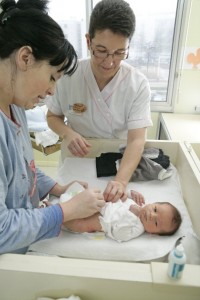
NCBH was regarded as a national model for its innovative and compassionate care practices (Photo By BSIP/UIG via Getty Images).
By Nan Strauss, Former Amnesty International USA Researcher
With just three days notice, the North Central Bronx Hospital (NCBH)’s Labor and Delivery service was shuttered after thirty-six years providing quality maternity care to 1500 women and babies a year. The award-winning midwife-led program at NCBH was regarded as a national model for its innovative and compassionate care practices, meeting the needs of at-risk women in an under-served community.
Eliminating NCBH’s successful program will reduce the quality of care and options available in this under-served community. The woman-centered, midwifery model of care practiced at NCHB is especially effective in addressing the health disparities faced by women of color and low-income women, but will no longer be an option in the area.
The closure will make it more difficult for low-income women to access care, increasing travel time and costs, and will end community-based care in the area. Surrounding hospitals that will be forced to absorb the additional 1500 births each year are already stretched thin.
 Before you keep reading, let’s be clear: this blog is about the universal human right to the highest attainable standard of health, the package of services it takes to be well—and the ability to afford it. It’s also about the implications of the Susan G. Komen Foundation’s decision to
Before you keep reading, let’s be clear: this blog is about the universal human right to the highest attainable standard of health, the package of services it takes to be well—and the ability to afford it. It’s also about the implications of the Susan G. Komen Foundation’s decision to 


 Although the United States spends $98 billion a year on health care (more than any other country), women in the US actually have a
Although the United States spends $98 billion a year on health care (more than any other country), women in the US actually have a